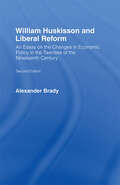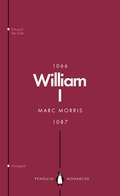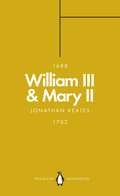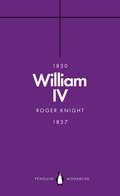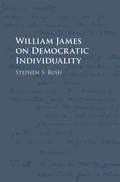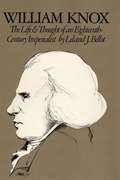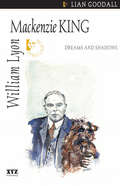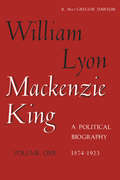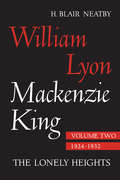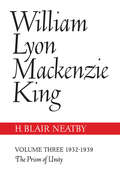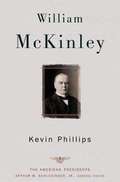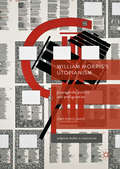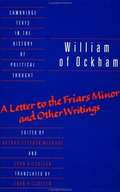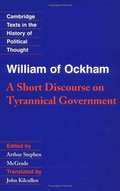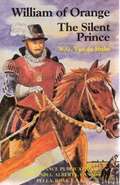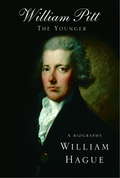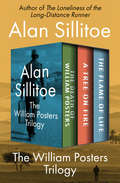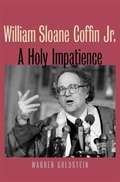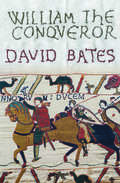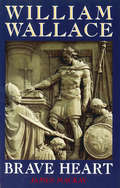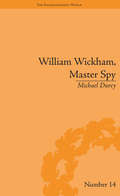- Table View
- List View
William Huskisson and Liberal Reform
by Alexander BradyFirst published in 1967. The first edition of this monograph has been out of print for many years. There is still a demand for it. This second edition, it is presented in its original form as an essay on the significant changes in commercial and imperial policy in the 1820's with which the name of Huskisson was associated. Since the first edition of this book two volumes on Huskisson have appeared and are mentioned here as useful supplements: The Huskisson Papers, edited by Lewis Melville (London, 1931) and Huskisson and His Age by C. R. Fay (London, 1951). The Huskisson Papers is a selection of the statesman's correspondence, from his stay in Paris during the early period of the French Revolution to his death in 1830.
William I: England's Conqueror (Penguin Monarchs)
by Marc MorrisOn Christmas Day 1066, William, duke of Normandy was crowned in Westminster, the first Norman king of England. It was a disaster: soldiers outside, thinking shouts of acclamation were treachery, torched the surrounding buildings. To later chroniclers, it was an omen of the catastrophes to come.During the reign of William the Conqueror, England experienced greater and more seismic change than at any point before or since. Marc Morris's concise and gripping biography sifts through the sources of the time to give a fresh view of the man who changed England more than any other, as old ruling elites were swept away, enemies at home and abroad (including those in his closest family) were crushed, swathes of the country were devastated and the map of the nation itself was redrawn, giving greater power than ever to the king. When, towards the end of his reign, William undertook a great survey of his new lands, his subjects compared it to the last judgement of God, the Domesday Book. England had been transformed forever.
William II: The Red King (Penguin Monarchs)
by John GillinghamWilliam II (1087-1100), or William Rufus, will always be most famous for his death: killed by an arrow while out hunting, perhaps through accident or perhaps murder. But, as John Gillingham makes clear in this elegant book, as the son and successor to William the Conqueror it was William Rufus who had to establish permanent Norman rule. A ruthless, irascible man, he frequently argued acrimoniously with his older brother Robert over their father's inheritance - but he also handed out effective justice, leaving as his legacy one of the most extraordinary of all medieval buildings, Westminster Hall.
William III & Mary II: Partners in Revolution (Penguin Monarchs)
by Jonathan KeatesWilliam III (1689-1702) & Mary II (1689-94) (Britain's only ever 'joint monarchs') changed the course of the entire country's history, coming to power through a coup (which involved Mary betraying her own father), reestablishing parliament on a new footing and, through commiting Britain to fighting France, initiating an immensely long period of warfare and colonial expansion. Jonathan Keates' wonderful book makes both monarchs vivid, the cold, shrewd 'Dutch' William and the shortlived Mary, whose life and death inspired Purcell to write some of his greatest music.
William IV: A King at Sea (Penguin Monarchs)
by Roger KnightWilliam IV, the 'Sailor King', reigned for just seven years. Rash and impetuous as a young man, he was sent to join the navy by his father, George III, to bring him to order, but he was overpromoted at an early age and saw his years of active service marked by a series of calamities. He was also notorious for his mounting debts and his long relationship with the actress Mrs Jordan, with whom he had ten children.Yet, as Roger Knight, one of Britain's foremost naval historians, shows in this concise and perceptive biography, William's bluff, unpolished sailor's manner made him popular with the people. Inheriting the throne amid strikes, riots and the push for parliamentary reform, he helped see the country through the great constitutional crisis of the era. Despite his many flaws, he was perhaps a better king than sailor, leaving the monarchy in a healthier state than when he found it, and enabling the smooth succession of his niece, Victoria.
William James on Democratic Individuality
by Bush Stephen S.William James (1842-1910) argued for a philosophy of democracy and pluralism that advocates individual and collective responsibility for our social arrangements, our morality, and our religion. In James' view, democracy resides first and foremost not in governmental institutions or in procedures such as voting, but rather in the characteristics of individuals, and in qualities of mind and conduct. It is a philosophy for social change, counselling action and hope despite the manifold challenges facing democratic politics, and these issues still resonate strongly today. In this book, Stephen Bush explores how these themes connect to James' philosophy of religion, his moral thought, his epistemology, his psychology, and his metaphysics. His fresh and original study highlights the relevance of James' thought to modern debates, and will appeal to scholars and students of moral and political philosophy.
William Jefferson Clinton (Profiles of the Presidents)
by Ann HeinrichsA biography discussing the personal life, education, and political career of the forty-second President of the United States, Bill Clinton.
William Knox: The Life & Thought of an Eighteenth-Century Imperialist
by Leland J. BellotColonial expert and pamphleteer William Knox has received attention in virtually every major study of the American Revolution, yet this is the first biography of Knox ever written. Knox is best known as undersecretary of state in the American Department of the British government from 1770 to 1782. A prolific and candid commentator, he also made a reputation as a pamphleteer, defending the imperial cause during the decade preceding the Revolution. It had been his experience as provost marshal in Georgia from 1757 to 1762 that convinced Knox of the danger to the empire of the growing "democratic" forces in the American colonies. While numerous historical works have focused on this or that aspect of Knox's career and thought, such treatment has produced at best a jigsaw portrait. Bellot's comprehensive narrative reveals Knox as a person--one whose Calvinist heritage and Scots-Irish upbringing profoundly influenced his view of empire--and as a historical actor and witness. Here is a look at the events of the revolutionary period through the eyes of a British bureaucrat who had a significant role in both the formation and the execution of British policy. This perspective also provides an excellent case study of the operation of the eighteenth-century British bureaucracy. Colonial expert and pamphleteer William Knox has received attention in virtually every major study of the American Revolution, yet this is the first biography of Knox ever written. Knox is best known as undersecretary of state in the American Department of the British government from 1770 to 1782. A prolific and candid commentator, he also made a reputation as a pamphleteer, defending the imperial cause during the decade preceding the Revolution. It had been his experience as provost marshal in Georgia from 1757 to 1762 that convinced Knox of the danger to the empire of the growing "democratic" forces in the American colonies. While numerous historical works have focused on this or that aspect of Knox's career and thought, such treatment has produced at best a jigsaw portrait. Bellot's comprehensive narrative reveals Knox as a person--one whose Calvinist heritage and Scots-Irish upbringing profoundly influenced his view of empire--and as a historical actor and witness. Here is a look at the events of the revolutionary period through the eyes of a British bureaucrat who had a significant role in both the formation and the execution of British policy. This perspective also provides an excellent case study of the operation of the eighteenth-century British bureaucracy.
William Lyon Mackenzie King: Dreams and Shadows
by Lian GoodallMackenzie King (1874-1950) was Canadas tenth and longest serving prime minister and an important figure on the international scene, especially during the Second World War. This book provides a fascinating glimpse into the world of Mackenzie King.
William Lyon Mackenzie King, Volume 1, 1874-1923
by Robert Macgregor DawsonWhen William Lyon Mackenzie King retired in 1948, he had held office as Prime Minister of Canada for a total of 7829 days, a longer term of service than that of any other Prime Minister in the history of the British Commonwealth. Like Roosevelt, his contemporary of many momentous years, he was greatly admired and greatly hated, but none dispute the tremendous influence he exerted on the history of his country, or, indeed, his place in world history. In this official biography, great days of Canadian history are given life and meaning, and at the centre of all the events is a phenomenal personality gifted with intelligence, intrepidity, and luck, with amazing insight into his times and the nature of his political occupation. The biography, based largely on sources hitherto unavailable, permits the reader to witness the unfolding of important events as a chief participant himself saw them and to view far-reaching decisions through the eyes of the man who made them, for Mackenzie King speaks in his own words through much of these volumes. They allow us to observe an extraordinarily complex and powerful personality at work. In this first volume, Mackenzie King's life and political career are traced up to the firm establishment of his first administration as Prime Minister. The forces in is background, education, and early interests which eventually led him into politics are brought out vividly. It is both fascinating and touching, for instance, to observe in letters and personal papers the intimate family relationships which so largely determined what Mackenzie Kind became. Once public service had been chosen, he displayed such talents that a leading role seems almost inevitable to all who knew him.
William Lyon Mackenzie King, Volume II, 1924-1932: The Lonely Heights
by H. NeatbyThis second volume of the official biography of Mackenzie King (the first, written by R. MacG. Dawson, was published in 1958) covers the years 1924 to 1932. At the opening of this period, King was still an inexperienced and untried leader but the next few years were to test his qualities as he dealt with the concessions and compromises necessary in governing with an unstable majority and finally emerged the winner from the complicated chess games of parliamentary sessions. The Liberal success in the election of 1926 returned to office a Prime Minister with confidence in his own judgment and more inclined to hold firm to his own opinions against opposition from his colleagues or his party. After this election and the outcome of that in 1930, which handed over to the Conservatives the problems of the depression, the myth of King's political infallibility continued to grow. But a less able man would have been less lucky. As this book shows, King was a consummate party leader, with an unusual sensitivity to political danger and an unusual capacity to learn from his mistakes. In the years 1924 to 1932 a number of familiar Canadian issues had to be dealt with: freight rates on land and sea, the debate between a tariff for protection, the problems of the Maritime Provinces, the natural resources of the Prairie Provinces, old age pensions, the St. Lawrence Waterway, immigration. There were also other more striking incidents, which the author chronicles with verve and style: the customs scandal of 1926, the heady pleasures of the years of prosperity and the dismal frustrations of the years of depression, the election of 1930, the Beauharnois sensation. Throughout skilful use is made of the public records of these years, of the King papers, and the copious pages of King's own daily diary of his political problems, his conversations with colleagues and diplomats, his worries and frustrations over difficult decisions, his own aims and ideals. Over these years King developed and strengthened his convictions about the over-riding concern of all Canadian political leaders, national unity. Only a proper estimate of what was desirable, what was necessary, and what was impossible could guide in the working out of policies that would be tolerable by the whole of Canada, and it was, of course, King's firm belief and the guiding principle of his political life that the cause of national unity was best served by the cause of Liberalism, since that party above all represented the major sections or groups in Canada and alone could effect a satisfactory compromise among them. This book, brilliant and effective in conception and execution, is a study of political leadership in a divided nation, a nation which even in calmer times is proverbially difficult to govern. It is also a revealing and convincing study of a complex man whose drab public image concealed unsuspected eccentricities.
William Lyon Mackenzie King, Volume III, 1932-1939: The Prism of Unity
by H. NeatbyAided by meticulous knowledge of the former Prime Minister's diary, and with characteristic conciseness and clarity, H. Blair Neatby has written the impressive and long-awaited third volume of the official biography of Mackenzie King. He carefully and judiciously untangles a complexity of issues in Canadian political history to produce definitive accounts of controversies that have engaged the attention of Canadian historians for years. Beginning the story in 1932, this volume treats the depression years when King was first in Opposition and then the years after 1935 when he was once again Prime Minister; it is a masterly analysis of how one of the most enigmatic figures in Canadian history made shrewd and critical political decisions. Attention is paid in turn to his clearly successful tactics as Leader of the Opposition; the election campaign of 1935; a wide range of his domestic policies, including those on unemployment, inflation, relief, and trade; and to a series of international crises – the Ethiopian crisis, the Spanish Civil War, Anschluss, and Munich – that culminated in the Second World War. At all times, King's overriding concern was to preserve national unity at home and to avoid commitments abroad, either through the British Commonwealth or the League of Nations. We see King in his relations with other Canadian leaders – Aberhart, Pattullo, Hepburn, Duplessis, and Bennett – and with world leaders – Roosevelt, Baldwin, Chamberlain, and Hitler. We also see the personal side of the man, and the link between the private and the public figure. William Lyon Mackenzie King, Volume III is an accomplished piece of historical writing; progressing in a controlled way through a profusion of incident and accident, it brings to completion the outstanding biography of a consummate politician.
William Marshal: Knight-Errant, Baron, and Regent of England
by Sidney PainterOriginally published in 1933. As mediaeval society was dominated by the feudal caste, a biography that depicts the position, activities, manners, and thoughts of a member of that class might do much to elucidate the history of the period. This is what Sidney Painter had in mind when he wrote a William Marshal: Knight-Errant, Baron, and Regent of England. The subject has proved a peculiarly fortunate one. The fourth son of John fitz Gilbert, marshal of the king's court, William for the first forty years of his life was a landless knight who devoted most of his time and energy to tournaments. In the year 1189 by his marriage to the daughter and heiress of Earl Richard of Pembroke, William became a great feudal lord with fiefs in Normandy, England, Wales, and Ireland. Thus his biography depicts the two extremes of feudal society—the landless knight and the rich baron. Finally in 1216 he was chosen regent of England for the young king, Henry III, and his biography becomes for three years the history of England.
William Mckinley: Twenty-fifth President of the United States
by David R. CollinsPresents the life of William McKinley, including his childhood, education, employment, and political career.
William McKinley (The American Presidents Series)
by Kevin Phillips Arthur M. SchlesingerBy any serious measurement, bestselling historian Kevin Phillips argues, William McKinley was a major American president. It was during his administration that the United States made its diplomatic and military debut as a world power. McKinley was one of eight presidents who, either in the White House or on the battlefield, stood as principals in successful wars, and he was among the six or seven to take office in what became recognized as a major realignment of the U.S. party system. Phillips, author of "Wealth and Democracy" and "The Cousins' War," has long been fascinated with McKinley in the context of how the GOP began each of its cycles of power. He argues that McKinley's lackluster ratings have been sustained not by unjust biographers but by years of criticism about his personality, indirect methodologies, middle-class demeanor, and tactical inability to inspire the American public. In this powerful and persuasive biography, Phillips musters convincing evidence that McKinley's desire to heal, renew prosperity, and reunite the country qualify him for promotion into the ranks of the chief executives.
William Morris’s Utopianism
by Owen HollandThis book offers a new interpretation of William Morris's utopianism as a strategic extension of his political writing. Morris's utopian writing, alongside his journalism and public lectures, constituted part of a sustained counter-hegemonic project that intervened both into the life-world of the fin de si#65533;cle socialist movement, as well as the dominant literary cultures of his day. Owen Holland demonstrates this by placing Morris in conversation with writers of first-wave feminism, nineteenth-century pastoralists, as well as the romance revivalists and imperialists of the 1880s. In doing so, he revises E. P. Thompson's and Miguel Abensour's argument that Morris's utopian writing should be conceived as anti-political and heuristic, concerned with the pedagogic education of desire, rather than with the more mundane work of propaganda. He shows how Morris's utopianism emerged against the grain of the now-here, embroiled in instrumental, propagandistic polemic, complicating Thompson's and Abensour's view of its anti-political character.
William of Ockham: A Letter to the Friars Minor and Other Writings
by Arthur Stephen Mcgrade John Kilcullen William Of OckhamMore than any other single thinker, William of Ockham (c.1285-1347) is responsible for the widely held modern assumption that religious and secular-political institutions should operate independently of one another.
William of Ockham: A Short Discourse on the Tyrannical Government
by William Of Ockham Arthur Stephen Mcgrade John KilcullenWilliam of Ockham (c. 1285-c. 1387) was the most eminent theologian and philosopher of his day, a Franciscan friar who came to believe that the Avignonese papacy of John XXII had set out to destroy the religious ideal on which his order was based: the complete poverty of Christ and the Apostles. A Short Discourse on Tyrannical Government is an attack on the claims of the medieval Church, specifically the papacy, to universal spiritual and secular power. Written at the time of the emergence of the European nation-states, Ockham's work issued a direct hard-hitting challenge to the claims of limitless papal power. The text is accompanied by a full bibliography, a chronology and an introduction setting his work in its intellectual and historical context.
William Of Orange: The Silent Prince
by W. G. Vandehulst Alice VeenendaalWilliam of Orange The Silent Prince by W.G. Van de Hulst
William Pitt the Younger
by William HagueThe Sunday Times bestselling biography of one of the towering figures in British history who became Prime Minister at the age of twenty-four, written by the youngest-ever leader of the Tory Party.
The William Posters Trilogy: The Death of William Posters, A Tree on Fire, and The Flame of Life (The William Posters Trilogy #1)
by Alan SillitoeThe bestselling author of The Loneliness of the Long-Distance Runner takes his examination of British working-class rebellion into the 1960s. In his best-known works of fiction, British novelist Alan Sillitoe “powerfully depicted revolt against authority by the young and working class” (The Washington Post). Both The Loneliness of the Long-Distance Runner and Saturday Night and Sunday Morning were international bestsellers and made into acclaimed films. Following those acknowledged masterpieces, Sillitoe continued to explore rebellion against an oppressive society in three novels linked by anarchist antihero Frank Dawley. In these powerful novels, Sillitoe would continue to prove himself “one of the best English writers” (The New York Times) and “the most quietly eloquent of his cohort of postwar British novelists” (Jonathan Lethem). The Death of William Posters: Frank Dawley has finally quit his soul-crushing factory job in Nottingham, left his alienating marriage, burned his possessions, and sold his car. Now he is hitching a ride to wherever the road will take him. Haunting Frank’s physical and existential travels is a ubiquitous inscription painted on nearly every street corner in England: BILL POSTERS WILL BE PROSECUTED. Relentlessly hounded by authorities, whoever William Posters is, he becomes a symbol of the servile proletariat—exactly what Frank hopes to escape. He finds his way from England to Spain to Morocco—and into the beds of several married women along the way. Finally, in Algeria, he meets a revolutionary American, whom he joins in a high-stakes gunrunning mission. A Tree on Fire: Jewish dilettante Myra Bassingfield is returning to England from Gibraltar with her four-week-old son. The child’s father, Frank Dawley, has disappeared into the African desert, where he is fighting for Algerian independence against French troops. Greeting Myra is Frank’s friend, Albert Handley, an idealistic painter living in a chaotic home with a large family. But after Albert’s brother burns down the house, the Handley brood moves in with Myra in Buckinghamshire. By the time Frank finally returns to England, they have formed a commune—a domestic cell of protest that may just plant the seeds of a new revolution. The Flame of Life: Collective cohabitation soon reveals its downfalls within the commune that has set up camp at the home of wealthy Myra Bassingfield. Painter Albert Handley is pursuing a whirlwind existence of art, sex, and chaotic domestic life. Frank Dawley, returned from gunrunning in Algeria, has brought his wife and two kids from Nottingham to live in the Buckinghamshire kibbutz. And when a young Spanish anarchist arrives with assassination on her mind, her trunk full of notebooks may condemn Frank for a sin committed in the African desert. As the community begins to unravel, the very notion of revolution comes under scrutiny.
William Sloane Coffin Jr.: A Holy Impatience
by Warren GoldsteinA magnet for controversy, the media, and followers, the Rev. William Sloane Coffin Jr. was the premier voice of northern religious liberalism for more than a quarter-century, and a worthy heir to the Rev. Martin Luther King Jr. From his pulpits at Yale University and, later, New York City's Riverside Church, Coffin focused national attention on civil rights, the anti-Vietnam War movement, disarmament, and gay rights. This revealing biography-based on unparalleled access to family papers and candid interviews with Coffin, his colleagues, family, friends, lovers, and wives-tells for the first time the remarkable story of Coffin's life. An army and CIA veteran before assuming the post of Yale University chaplain at the youthful age of 33, Coffin gained notoriety as a leader of a dangerous civil rights Freedom Ride in 1961, as a defendant in the "Boston Five" trial of draft resisters in 1969, and as the preeminent voice of liberal religious dissent into the 1980s. This book encompasses Coffin's turbulent private life as well as his flamboyant, joyful public career, while dramatically illuminating the larger social movements that consumed his days and defined his times.
William the Conqueror
by David BatesFifteen years in the making, a landmark reinterpretation of the life of a pivotal figure in British and European history In this magisterial addition to the Yale English Monarchs series, David Bates combines biography and a multidisciplinary approach to examine the life of a major figure in British and European history. Using a framework derived from studies of early medieval kingship, he assesses each phase of William's life to establish why so many trusted William to invade England in 1066 and the consequences of this on the history of the so-called Norman Conquest after the Battle of Hastings and for generations to come. A leading historian of the period, Bates is notable for having worked extensively in the archives of northern France and discovered many eleventh- and twelfth-century charters largely unnoticed by English-language scholars. Taking an innovative approach, he argues for a move away from old perceptions and controversies associated with William's life and the Norman Conquest. This deeply researched volume is the scholarly biography for our generation.
William Wallace: Brave Heart
by Dr James MackaySir William Wallace of Ellerslie is one of history's greatest heroes, but also one of its greatest enigmas - a shadowy figure whose edges have been blurred by myth and legend. Even the date and place of his birth have been mis-stated - until now. James Mackay uses all his skills as a historical detective to produce this definitive biography, telling the incredible story of a man who, without wealth or noble birth, rose to become Guardian of Scotland. William Wallace, with superb generalship and tactical genius, led a country with no previous warlike tradition to triumph gloriously over the much larger, better-armed and better-trained English forces. Seven hundred years later, the heroism and betrayal, the valiant deeds and the dark atrocities, and the struggle of a small nation against a brutal and powerful empire, still create a compelling tale.
William Wickham, Master Spy: The Secret War Against the French Revolution (The Enlightenment World #14)
by Michael DureyA biography of William Wickham (1761-1840), Britain's master spy on the Continent for more than five years during the French Revolutionary wars. It follows Wickham's career to narrate the rise and fall of his secret service community.
